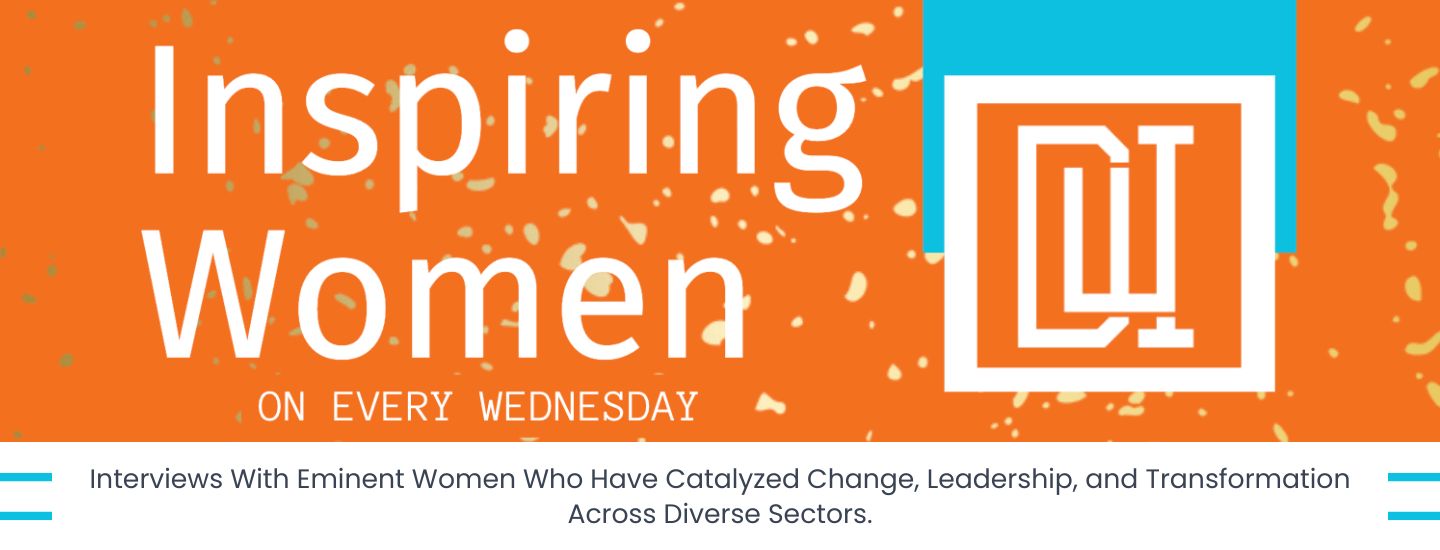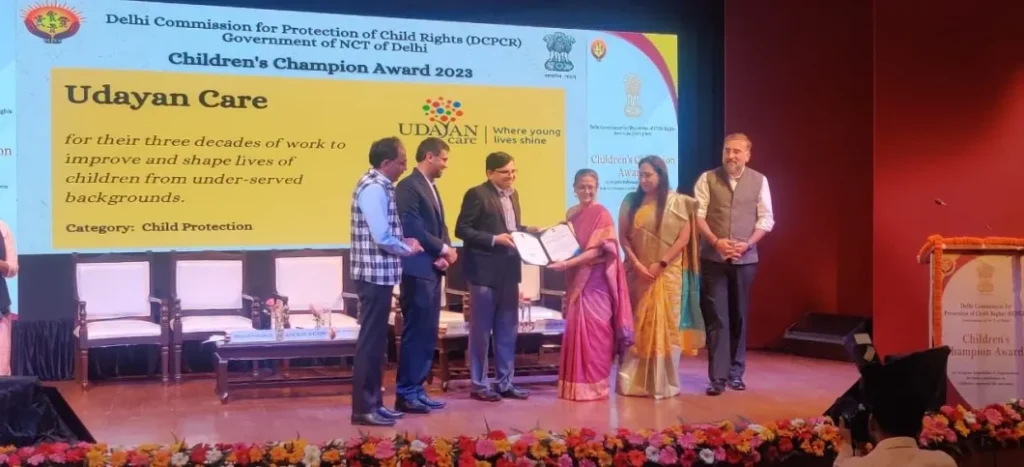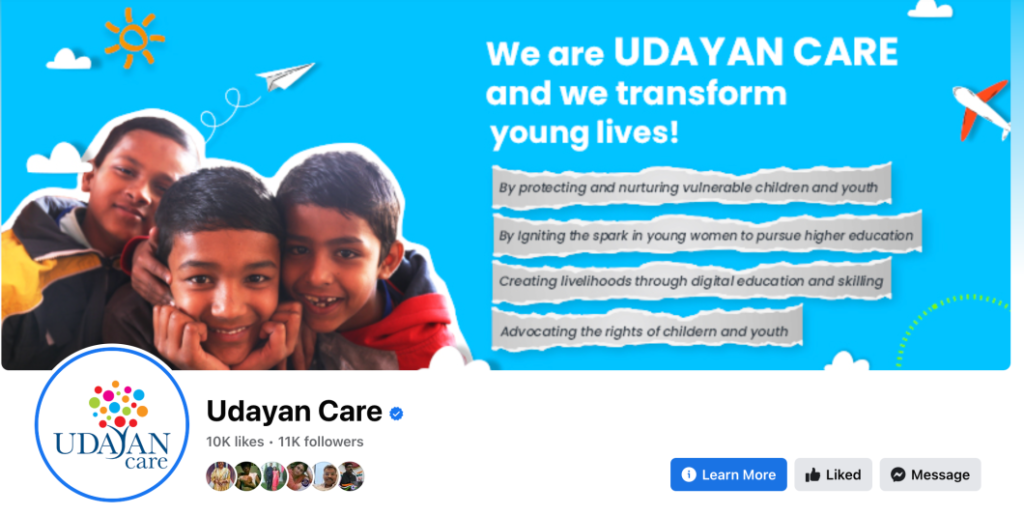

Dr. Kiran Modi was the first to launch Delhi’s inaugural community tabloid, ‘Neighborhood Star’, in 1984 and established ‘Udayan Care’ in 1994, a Trust for disadvantaged & at-risk children and women. Later followed the flagship programmed’ Udayan Ghars’ (Sunshine Family Homes) for orphaned and abandoned children, with a vision to regenerate the rhythm of life of the disadvantaged and on a mission- ‘Making Young Lives Shine’.




Currently, 17 Children’s Homes and 2 Aftercare Programmes, and 17 IT Training Centres covering more than 250 children, 7500 girls and nearly 2000 youths benefit annually.
Let’s Get Inspired
In Conversation with Dr. Kiran Modi – Preeti Juneja
Q. Who was your role model before you started making a difference in someone’s life? What about that person inspired you so much, making your commitment rock solid?
Granddaughter of a great industrialist, who left his famine-stricken village in Rajasthan in search of greener pastures, at the young age of 10, and made it big thousands of kilometers away in Kolkata, I was always inspired by his courage to face the consequences of one’s actions, and the never say die spirit to fight all adversities and take them headlong. He was my first inspiration, who traversed the commercial world from India to Germany to Japan, without even knowing letters.
He used to laugh at himself, a true ‘angooath chaap,’ he would name himself, and call me every evening, all of 14 years, to write his correspondence, that he would dictate to me in Marwari, and expect me to write in Hindi or English, as per the need. Looking at him I used to marvel at his determination and will, I think I imbibed that from him, that you only set limit for yourself; out there is the great expanse and you can fly higher and higher. His belief in me that I would be able to capture his thoughts and ideas in the letters I drafted for him, further developed my self-confidence.
lways used to think as a child, if only he was educated, where would he reach; that became my first push to think of educating, especially girls from underprivileged backgrounds, to achieve their true potential, and I taught several disadvantaged girls while in school myself.
-Dr. Kiran Modi
I saw him undergoing crisis after crisis, he did buckle in too, only to bounce back as family and relatives were his responsibility. You cannot wallow in self-pain, you have to rise to the occasion. I think this propelled me to sublimate my pain, my personal loss, in serving others – This is how I decided to set up Udayan Care, developing an umbrella of services that can strengthen a family, serving the cause of child protection, education and livelihood.
Udayan Care has gone on to include residential care as well as community care programmes for children out of family care (Udayan Ghars & FIT Families Together), higher education for underprivileged girls (USF: Udayan Shalini Fellowships) and vocational training for the underprivileged communities (UCITVT: Udayan Care Information Technology and Vocational Training Centres) to empower them by providing trainings and livelihood opportunities.
Standing up for the rights of children has become but a natural accompaniment to my work and commitment. Udayan Care has played, and continues to play, a significant role in improving the state of the rights of the children of India, both through direct intervention and through research, publications, and advocating for policy reforms. It participates and indeed, leads the way, in positive mental health issues, research in alternative care; advocates for charter of children rights; and training of caregivers, volunteers, mentors, professionals and child protection functionaries, amongst others.
Q. You have taken a holistic approach by introducing many programs under Udayan Care. Did you feel burdened at any point? As these challenges and opportunities unfolded before you, how did you approach time management, resource management & project management?
There is a continuum in my life, it carries on oscillating between two opposing spectrums – sorrow and sadness on one hand, when you see so much want all around and lives getting wasted just because of the lack of opportunities, and happiness and joy on the other, when you see smile on the faces and determination in the eyes, despite hardships, just because someone is there to hold hands.
I think it is my determination and firm belief that each life deserves equitable opportunities and justice and that challenges are not obstacles, it is up to you to turn them into opportunities, that has kept me going, expanding the reach far and wide.
As also my conviction that everything that we do has to be aligned with deep thought and researched content behind each intervention and advocacy effort, that has made our programmes so relevant, and kept them apt with changing times.
They say when you desire something strong enough, universe also conspires to make it possible. I don’t think it was the skills you mentioned, like time management, resource management and project management, so much as my commitment to the cause that drew so many people, who became life-long volunteers and supporters, who brought in the skills wherever I lacked. We learnt together, we experimented, worked hard, and just grew in ecstasy and contentment as well as occasional self-doubts.
One of my very dear members calls my style of working as ‘Mother Management,’ whatever it means. Today with our programmes in 15 states and 38 cities, with staff of over 270 and a skilled volunteer force of 1500, with reasonable systems and processes, we are always on a learning curve, and as you learn more, the more you discover areas of improvement, and together we go on…
The questions that assailed us from the beginning: Is running welfare programmes enough!?
It became clear that Impact can be accelerated only by advocacy, advocating with Government for policy reforms, with civil society for attitudinal change in perceptions towards disadvantaged-ness; trainings, which can influence and improve the child care workers’ efforts, research, which can generate evidence, leading to improvement of practices. More questions: How do you make the balance? How do you decide the direction in which Udayan Care should be moving? How much do you expand without compromising on quality and the personal magical touch that transforms a child? To sustain the organization beyond the founders, the organisation has to have reached a certain breadth – where is that line to be drawn?

Q. Many people look up to you, get inspired by you, and want to be like you. How do you balance your emotions at work in a field where love is in excess and so is pain? When people start looking at you as a god figure, with raised hopes and miracles to happen.
I really don’t think I have so much adulation, that people want to be like me. They may get inspired but that’s a bit different.
How do I balance my emotion, that’s a tough one. Once some one taught me, to say ‘no’ is the hardest thing, but once you are in this sector, you have to learn to say ‘no’ to many things, for ex, you cannot take up possibly every cause, nor can you help every needy person. You have to be focused on what you can do and what is beyond you. Once you are clear, demands too will be streamlined automatically. Emotions still do run high, but one needs to manage oneself, as well as others’ expectations.
Your last line makes one sound like some Mother Teresa. I am not one, nor can I ever be. No miracles; raised hopes, yes, but you and the beneficiary both need to work hard to actualize that hope.
Q. What are the tactical initiatives or strategic campaigns in the line of marketing and communications, advocacy, and brand building for Udayan Care that have been effective?
Everything that we do in terms of communication, we do try to keep our brand at the middle of it. Whether brand image or identity, what we stand for, personality, language, colours, typography, etc.
I can name one campaign that was very effective: Spread Love, Not Corona. Similarly, certain days of the week are outlined for success stories and events. We seek volunteers and mentors through campaigning too.

Q. What is meant by Psycho-Social support for children at Udayan Care? How do you address the issue of mental health and well-being of children? Ensure they feel well-adjusted in community living after attaining 18 years of age for both boys and girls
We are dealing with children and youth coming from different and difficult circumstances, but those ‘without parental care’ need a lot more psycho-social support. When they come to us in our Udayan Ghar Programme, they are generally wary of trusting anyone owing to the separation/s and betrayal of trust that they have faced. Our mental health framework is a comprehensive preventive program, on TIC (Trauma Informed Care) model to ensure that our children learn to come to terms with their traumatized past and look towards shaping their future. It enables the children to have a belief in others and, most importantly, in themselves.
A child psychiatrist is heading our mental health team consisting of a psychotherapist, psychologists, counsellors and social workers, who share and foster healthy relationships with the children. There are also pharmacological interventions for children with severe emotional and behavioral problems. This association has worked quite well in ensuring that there is a comprehensive and developmentally sensitive mental health care plan (MHCP) in place for the children that address both critical and mental health issues, which is added to their Care plans.
An Individual Care Plan (ICP) is developed for each child along with the child and all carers (mentors, Social workers, counsellors) directly responsible for the upbringing of the particular child. Each ICP is reviewed quarterly, and progress is gauged over regular intervals to ascertain whether there is any improvement or progress in the child and whether the mental health program is making a difference or not. Weekly team meetings are organized to generate synergy among the team and also to discuss challenges and the way forward for specific cases.
We believe that this kind of exhaustive planning and psycho social support will prepare them eventually to get adjusted in community once they are on their own. But at 18, they still need aftercare support, which we provide them, and support with housing, nutrition, education and psycho-social support, capacity building, both in soft and hard skills, especially in resilience building, financial literacy, internships and job placements.
All this helps and they start getting adjusted.
In our other programmes where these youth live with their own families, we provide such support only as and when needed. For our work in communities, we have a counselor force who works with children and families. We also have some counselors to whom we can refer cases.

Q. What is the screening process if someone wants to be a Mentor Parent? What qualities or traits would you look for in that person?
Udayan Ghars have a unique model of long-term committed volunteers, called Mentor Parents, who work in a home and have functions of a parent, to obtain opportunities for children for education, talent, leisure and outings, counsel and widen the children’s horizons and become a window to the world for them. Though they don’t live with children,but they come 2-3 times in a week to be with them.
If someone likes the role of a mentor parent, we always ask them to become a volunteer first and work out themselves if they still are wanting to become one. We always want our mentors to be long term. Children need stable figures in their lives, a caring adult who would be there to hand hold and not drop them at one’s convenience. To be a mentor means long term and sort of permanent position in the child’s life. You need to have that kind of commitment where you will be able to withstand all the challenges of raising a child, whose past is unknown to you, who is coming from a different kind of setting than yours, and who would be suffering from the aftermath of many PTEs: Post Traumatic Events and Disorders. Someone who is not going to be a financial drain on the organization, but shall be opening up many doors, create linkages, community connections, etc. Automatically, the qualities start becoming clearer: committed, determined, reflective not judgmental, connector, team worker, so on and so forth.
Each home has at least 2 to 3 Mentor Parents, who bring long-term attachment to the children and fulfill the role of parents, and support the to the team of caregivers, social workers, and mental health professionals. All mentor parents are socially committed, civil society members in the age group of 45 and above, who have experience of successfully raising their children and are networked well to be able to raise resources for the homes.
There are 29 Mentor Parents across all 16 Udayan Ghars in 4 states.
Rapid-Fire:
- A successful collaboration that helped Udayan Care I would like to mention Genpact (a corporate) and iPartner India (A funding agency); almost two decades of collaboration which brought funds, technical knowledge, and support.
- If you want to give one message, what would it be? Don’t worry, as it’s His, the Maker’s job, not yours; have faith, work hard, it will happen.
- What comes to your mind when someone says “destiny”? I am a great believer in destiny, to the extent I believe you don’t meet people for nothing, you don’t come across something for nothing, there is something destined, and it’s up to you to make use of it.
- In your free time, what do you enjoy doing? First, one needs to define that ‘free’ time. If you are reading, writing, or watching a film, you are still doing something.
- When you really desire something, it starts happening in the cosmos. What is your next desire? To leave, when my time comes, ‘Udayan Care’ a self-sufficient organization.
One-Liners:
- Dr. Kiran Modi stands for commitment, diligence, and quality work
- I’m a devotee of Higher Power and its manifestations
- For me, zero tolerance is not accepting any violation of dignity and rules
- I want to see a change in attitudes and misplaced beliefs
- One book everyone must read I don’t know about everyone, as I believe people know what is best for them, I don’t; for me, my favorite book is “Gone with the Wind”
About Author

Dr. Kiran Modi
Dr. Kiran Modi, the Founder, Managing Trustee of Udayan Care, is a doctorate in American Literature from IIT, Delhi. She is a renowned figure and an exceptional person who has garnered immense respect and expertise in diverse domains, including media and the realm of children’s theatre. Dr. Kiran has established herself as a trailblazer in her field, leaving an indelible mark on countless lives. She has been instrumental in launching multiple trusts to serve the disadvantaged.
16th August 2023
Share this article
Inspiring Women
More Interviews
Share this article
Do you have a question for Dr. Kiran Modi ? Write to us at preeti.juneja@dreamwebindia.com





